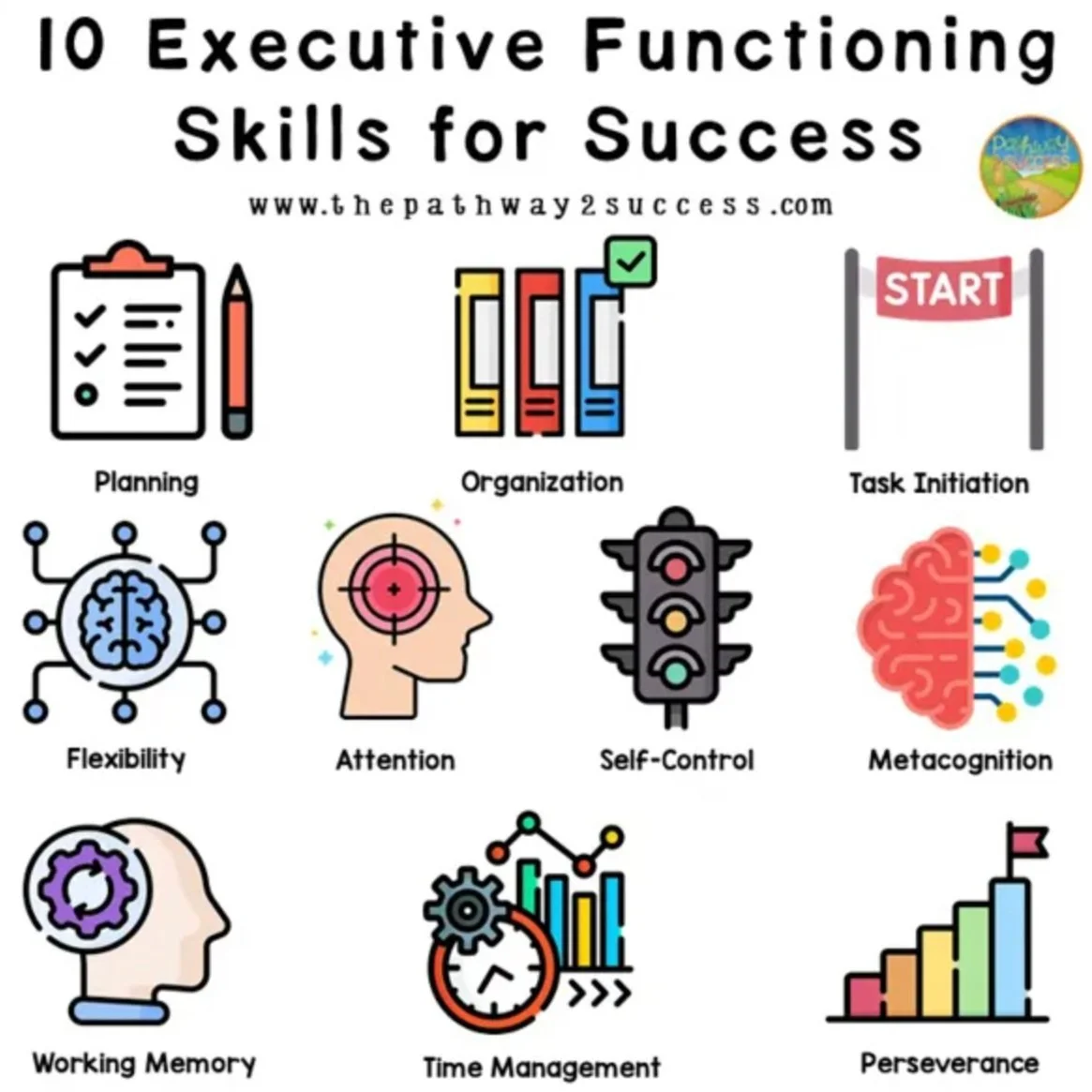What are Executive Functioning Skills?
Executive function (EF) skills are the skills that allow us to
plan, organize, and manage our thoughts and actions.
(Image Credit: The Pathways 2 Success)
“Harvard University’s Center on the Developing Child likens executive function to a personal air traffic control system that helps our brains prioritize tasks and stay focused”(U.S. News). Strong executive functioning helps us follow directions, solve problems, meal plan & create a correlated grocery list, manage long-term assignments, and resist distractions.
The 10 executive functioning skills are…
Planning is the ability to set goals and figure out the steps towards accomplishing the goal.
Organization is the ability to develop and maintain a system to keep track of plans and materials.
Time Management is having an accurate understanding of estimating how long tasks take, and then using time efficiently to meet deadlines.
Task Initiation is the ability to begin tasks in a timely manner (without any, or excessive, procrastination).
Working Memory is the ability to hold information in our brains while working with it. (Example: remembering directions or instructions, holding onto different parts of a conversation while waiting for the point, and solving mental math problems.)
Metacognition is having an awareness and understanding of what you know and don’t know, which helps inform what you need to learn moving forward.
Self-Control is the ability to regulate your thoughts, actions, and feelings.
Sustained Attention is the ability to focus on a person or task for a given period of time.
Flexibility is the ability to adapt and deal with new situations and changes. This includes perspective taking and trying new approaches when needed.
Perseverance is the ability to work through challenges in order to accomplish a task or goal.
How Do We Learn EF Skills?
We typically learn at least some of our executive function skills through the modeling and routines set at home and in school. For example: getting to school on-time (time management, planning), having school supplies (planning, organization), following teacher directions (self-control, attention, working memory), and so on.
“Adults can facilitate the development of a child’s executive function skills by establishing routines, modeling social behavior, and creating and maintaining supportive, reliable relationships” (Harvard University).
We also learn EF skills through play and games. Below are examples of how EF skills are practiced while playing Monopoly:
Planning - strategizing for one’s next move or plan for a property
Organization - keeping Monopoly and all of it’s pieces in an organized and predictable place
Working Memory - calculating rent
Self-Control - managing behavior, especially when winning or losing
Sustained Attention - following and playing the game
Flexibility - adapting to the flow of the game, especially if a player is bankrupted
Perseverance - necessary for following and playing a multi-player game, especially during a player’s highs and lows
How Do I Know If I Need EF Coaching?
Just as there is not one set clinical definition for executive function and it’s related skillset, there isn’t a clinical diagnosis or one set definition for executive dysfunction. The easiest way to understand executive dysfunction is when someone is having difficulty with one or more of the EF skills. When screening clients, I typically ask “how do your EF weakness(es) negatively impact your academic or work performance, social life and relationships, and day-to-day functioning and daily living skills?”
Unsure what EF skills might look like for yourself or your child?
Here is a chart that shows executive function skills by developmental age. Please keep in mind that this is just a flexible framework to be used as a starting point for a deeper conversation, not a diagnostic tool.
How Can Kanter Coaching Help You?
Coaching can help you:
Understand which executive function skills are your strengths and which need to be strengthened.
Create a plan for strengthening EF skills.
Learn how to utilize your strengths.
Promote a work-school-life balance with time for rest, relationships, and passion projects.
References
D'Orio, W. (2022, July 1). What are executive functioning skills and why do students need them? U.S. News & World Report. Retrieved from https://www.usnews.com/education/k12/articles/what-are-executive-functioning-skills-and-why-do-students-need-them
Executive function & self-regulation. Center on the Developing Child at Harvard University. (2020, March 24). Retrieved from https://developingchild.harvard.edu/science/key-concepts/executive-function/#:~:text=Adults%20can%20facilitate%20the%20development,and%20maintaining%20supportive%2C%20reliable%20relationships.
Perler, S. (2020, May 22). Executive function: Nature or nurture? Seth Perler. Retrieved from https://sethperler.com/executive-function-nature-or-nurture/
Perler, S. (2020, June 6). What is executive functioning? How does it affect my child? Seth Perler. Retrieved from https://sethperler.com/executive-function-holy-grail/
Scully, K. (n.d.). Executive functioning skills. The Pathway 2 Success. Retrieved from https://www.thepathway2success.com/executive-functioning-skills/
Scully, K. (2021, August 24). 10 executive functioning skills: The ultimate guide. The Pathway 2 Success. Retrieved from https://www.thepathway2success.com/10-executive-functioning-skills-the-ultimate-guide/
Sippl, A. (2021, December 25). Executive function skills by age: what to look for. Life Skills Advocate. Retrieved from https://lifeskillsadvocate.com/blog/executive-function-skills-by-age/
What is executive function? How executive functioning skills affect early development? Center on the Developing Child at Harvard University. (2020, October 30). Retrieved from https://developingchild.harvard.edu/resources/what-is-executive-function-and-how-does-it-relate-to-child-development/

